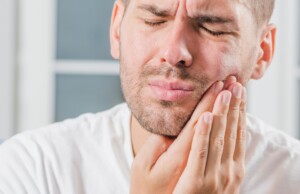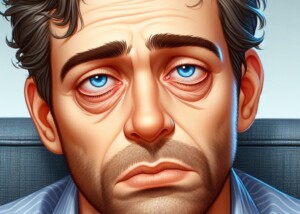
Have you been diagnosed with both TMJ disorder and sleep apnea and are wondering if the TMJ problem is causing or aggravating your sleep apnea?
It’s no picnic having both TMJ disorder and obstructive sleep apnea (OSA).
TMJ disorder (also known as TMD) is a pain to have.
Untreated sleep apnea does not typically cause pain, but it most certainly causes other issues like snoring (usually), excessive daytime drowsiness and difficulty concentrating, but sometimes it can also result in morning headaches.
OSA can cause morning headaches due to interrupted sleep and reduced oxygen levels during the night.
The frequent pauses in breathing lead to lower oxygen and higher carbon dioxide levels in the blood, resulting in poor sleep quality.
This can cause blood vessels in the brain to dilate, leading to headaches.
Additionally, the disrupted sleep often leads to muscle tension and stress, further contributing to morning headaches.
TMJ disorder, too, can cause headaches – but not just in the morning.
The headaches from TMD come from the strain and dysfunction in the temporomandibular joint.
The pain and muscle tension from TMJ issues often radiate to the head, leading to tension-type headaches.
The Big Question
But can temporomandibular joint disorder either cause obstructive sleep apnea or make pre-existing sleep apnea worse?
“No, TMD and sleep apnea are totally different conditions that can sometimes overlap but are caused by different things,” says Dr. Haissam Dahan, DMD, MSc, PhD, lecturer at Harvard and McGill University and owner of Ottawa TMJ & Sleep Apnea Clinic.
Dr. Dahan also says, “TMD is a painful condition of the jaw muscles, joint and cartilage, while sleep apnea is a sleep disorder that causes people to lose oxygen while asleep.”
Dentists can help patients with obstructive sleep apnea by fashioning a custom-made mandibular advancement device (MAD).
It looks like an athlete’s mouth guard and shifts the lower jaw forward while the patient is asleep.
This opens up the airway to prevent blockage from the base of the tongue. The MAD is sometimes recommended as a treatment for only mild obstructive sleep apnea.
When the tongue relaxes too much while someone is asleep, it can fall backwards against the throat, partially or completely blocking the airway.
This process is not caused by or made worse by TMJ disorder.
TMJ disorder has nothing to do with the tongue slipping backwards overnight.
Another cause of obstructive sleep apnea is a big uvula — that thing in the back of the throat that looks like a punching bag.
If the uvula is big enough, the over-relaxed tongue can press it into the back of the airway—obstructing airflow.
Another cause of OSA is that of just having a lot of throat or pharyngeal tissue.
During sleep it can collapse and block the airway.
Having a naturally narrow airway is another risk factor for OSA.
None of these dynamics are influenced by TMJ disorder, let alone caused by it.
Here is another TMJ specialist’s take on the connection to sleep apnea:
 Dr. Dahan is a general dentist with a focus on TMJ disorder, facial pain, snoring and sleep apnea management.
Dr. Dahan is a general dentist with a focus on TMJ disorder, facial pain, snoring and sleep apnea management.
 Lorra Garrick is a former personal trainer certified by the American Council on Exercise. At Bally Total Fitness she trained clients of all ages for fat loss, muscle building, fitness and improved health.
Lorra Garrick is a former personal trainer certified by the American Council on Exercise. At Bally Total Fitness she trained clients of all ages for fat loss, muscle building, fitness and improved health.
.









































